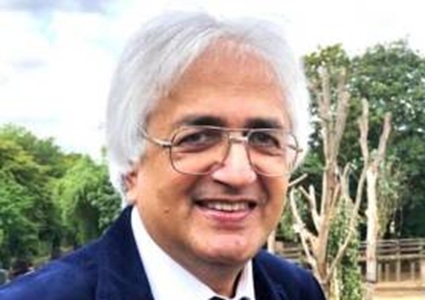Professor Sir Ali Zumla Leads Call to Strengthen the Global TB Response Amid USAID Funding Cuts
28 February 2025
In a new comment published in The Lancet, Professor Sir Alimuddin (Ali) Zumla and co-authors from around the world warn that recent United States Agency for International Development (USAID) funding cuts are already impacting the fight against tuberculosis.
This comment, titled Breaking dependency – strengthening the global TB response, sees Sir Ali and his co-authors from Europe, Asia, Africa and South America warn that recent United States Agency for International Development (USAID) funding cuts are already hindering the global fight against tuberculosis, especially in low- and middle-income countries (LMICs).
They highlight that USAID has been a cornerstone of global TB funding, allocating $406 million in 2024 alone to support diagnosis, treatment, and prevention efforts across Africa and Asia. They also warn that the sudden USAID funding freeze threatens to reverse decades of progress, worsening an already severe $11 billion funding shortfall for TB programs.
As the world prepares to mark World Tuberculosis Day on March 24, 2025, Sir Ali and co-authors Lancet emphasize that the devastating impact of these cuts will have on TB control programs worldwide. The abrupt USAID funding freeze is already hindering the global TB response, particularly in low- and middle-income countries (LMICs), where USAID has been a cornerstone of TB funding though allocating $406 million in 2024 alone.
Sir Ali Zumla says: “With an existing $11 billion shortfall in TB funding, these cuts risk reversing decades of progress. The UK government’s recent decision to reduce its overseas aid budget only compounds the challenge!”
Sir Ali and co-authors highlight that the funding crises presents an opportunity for high TB burden countries and the global community to act quickly and move forward beyond donor dependency and strengthen global TB responses.
They propose several practical solutions to fill the gaps and develop sustainable strategies to strengthen the global TB response to control the TB epidemic, through:
- Diversifying funding sources: High-TB-burden nations and philanthropic organizations (e.g., Gates Foundation, Open Philanthropy) must step up. Nigeria’s recent $200 million commitment to offset USAID cuts is a positive example.
- Boosting domestic TB financing: LMICs should implement health levies, insurance schemes, and increased budget allocations, following India and Nigeria’s lead.
- Expanding local manufacturing: India and South Africa must spearhead affordable TB diagnostics and treatment production, as they did with HIV/AIDS.
- Strengthening regional collaborations: BRICS nations and multilateral development banks should increase investments in TB programs and research.
- Accelerating TB vaccine development: Greater investment is needed to fast-track promising vaccine candidates and ensure equitable distribution.
- Integrating TB and HIV services: A holistic approach must tackle TB alongside poverty, malnutrition, and weak healthcare infrastructure.
Sir Ali and co-authors conclude by saying:
While USAID’s funding cuts represent a major setback, they must also serve as a catalyst for change. This is a moment for global solidarity, commitment, and innovation. As the world commemorates World TB Day 2025, the message is clear: This is not the time for panic, but for decisive action.
About the authors
This commentary was led by Professor Sir Alimuddin Zumla (UCL, CCM) and co-authored by a distinguished group of global health experts from University College London; the Stop TB Partnership Secretariat-Geneva; Noguchi Memorial Institute for Medical Research, University of Ghana, Accra, Ghana; National Institute for Infectious Diseases Lazzaro Spallanzani, Rome, Italy; Faculty of Medicine and Health Sciences, Stellenbosch University, Cape Town, South Africa; National Institute of Medical Research, Dar-es-Salaam, Tanzania; University of Zambia School of Medicine, Lusaka; Fondation Congolaise Pour la Recherche Médicale, Brazzaville, Republic of Congo; Faculty of Health Sciences, Universidad Cientifica del Sur, Lima, Peru; College of Medicine and Health Science, Khalifa University, Abu Dhabi; Monash University Malaysia, Kuala Lumpur, Malaysia; and Chinese University of Hong Kong, Shatin, New Territories, Hong Kong.
For media journalists and journals
Journalists and academics are encouraged to highlight the urgent need for global action and the importance of sustainable funding solutions to ensure TB control efforts are not derailed.
Source: University College London

